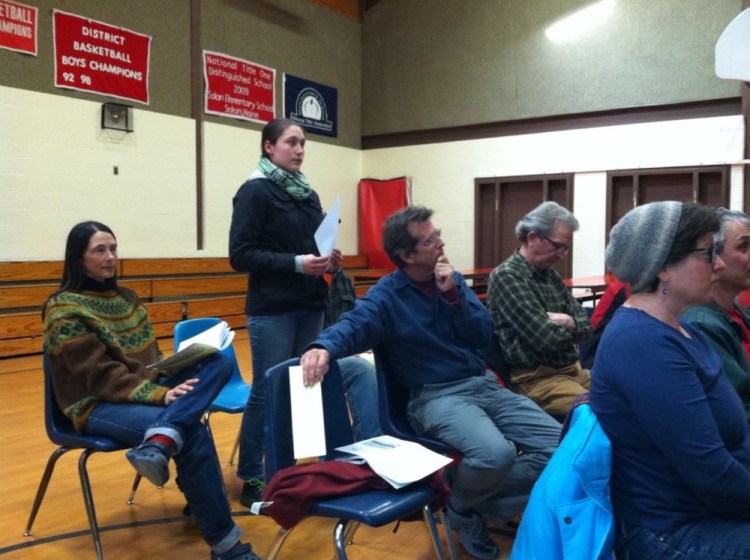SOLON — The town of Solon became the first community in Maine on Saturday to impose a moratorium on hydraulic fracturing or “fracking” — but it came with three important exceptions.
The one-year moratorium adopted at the annual Town Meeting wasn’t just about using chemicals for mining oil and natural gas, which a state official has said is unlikely to occur here anyway.
It also was about using the method to rejuvenate septic leach fields, increase the yield in drilled water wells and remove groundwater contamination.
Those three exceptions were added to the original plan and it was adopted, by a clear majority in a show-of-hands vote, giving the town’s Planning Board a year to research the subject and report back with a proposed ordinance at next year’s Town Meeting.
The measure’s intent was to protect the town’s water resources, but the state geologist said last week that no fracking is taking place in Maine because the state has no known gas and oil deposits, and the state’s rocky subterranean is simply not suitable for the practice.
Frank Ridley, who asked that the question be put on the Town Meeting warrant, said it would be good practice to have such a moratorium in place — just in case. He also was the first to point out the benefits of the practice.
“Every time I think about the horrors of fracking throughout a big part of the country, it frightens me with the possibility that it could come to New England, it could come to Maine,” Ridley said. “It’s as far east as New York state.”
Ridley read from a letter by a certified geologist, noting its use in leach fields. A company in St. Albans does that, he said. He also said the method is valuable in getting more water from drilled wells and can assist in eliminating groundwater contamination.
Solon residents debated the question and its amendments for more than an hour, some saying it was just a political statement with no meaning in Maine. Others said it was a wise move to adopt the moratorium, noting that some people in communities in other states who wish they could go back in time and ban the practice.
“It may seem far-fetched, but I think making a statement is good,” resident Chris Wright said.
Sikwani Dana, a fourth-year student at the University of Maine at Farmington who has studied geology, cautioned residents that although no fracking is occurring in Maine, things can change.
Technology can change and natural shifts in the earth could suddenly make the practice viable in the state, said Dana, who is majoring in secondary education at UMF, with a minor in geology.
“I have a personal interest in this, too,” she said. “I love this area and I want to finish my years here. I want to live here for the rest of my life, so the quality of the drinking water is a huge concern to me.”
In other action Saturday, Solon residents agreed to raise $8,000 to pay the Internal Revenue Service for interest related to errors in the filing of town payroll taxes in 2011, 2012 and 2013. First Selectwoman Elaine Aloes said income tax laws changed in 2011 and then-Town Treasurer Judith Robertson “had difficulty with that.”
The owed money was in the bank and was paid immediately when the errors were discovered, Aloes said, but the town had to hire a tax lawyer to help straighten things out. Aloes said the interest payments owed will be $5,000 or less. The town also has to pay legal fees. The IRS has waived the penalties.
Robertson stepped down after last year’s Town Meeting. Sharon Begin was appointed to take her place and was elected on the ballot this year to a one-year term. Residents voted to change the position of town treasurer from an elective post to an appointive one. The change will take place March 5, 2016.
Robertson also has offered to pay back all of the money that had been unaccounted for, but voters on Saturday agreed not to take any money from her.
The final budget figures Saturday totaled $399,879 for the coming year, about $25,300 more than last year.
Spending increases are the result of a loss of state revenue sharing money and some increases to summer and winter roads spending. Proposed spending for winter roads in the coming year is $90,000; and for summer roads, $100,000, including the purchase of gravel to rebuild some of the back roads.
Aloes said the town tax rate of $16 per $1,000 in property valuation will increase slightly. Voters also agreed to take $80,000 from surplus to reduce taxes.
In elections held Saturday, 77 votes were cast. Voters re-elected Selectwoman Mary Lou Ridley, Town Clerk and Tax Collector Leslie Giroux, Road Commissioner Michael Foster and school board director Leslie Giroux. About 60 people attended the business portion of the meeting.
Somerset Count Commissioner Phil Roy, of Fairfield, was Town Meeting moderator.
Doug Harlow — 612-2367
Twitter: @Doug_Harlow
Copy the Story LinkSend questions/comments to the editors.




Success. Please wait for the page to reload. If the page does not reload within 5 seconds, please refresh the page.
Enter your email and password to access comments.
Hi, to comment on stories you must . This profile is in addition to your subscription and website login.
Already have a commenting profile? .
Invalid username/password.
Please check your email to confirm and complete your registration.
Only subscribers are eligible to post comments. Please subscribe or login first for digital access. Here’s why.
Use the form below to reset your password. When you've submitted your account email, we will send an email with a reset code.